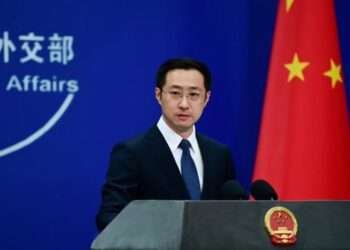Faiza Shaheen, a Labour Party candidate blocked from standing in the Chingford and Woodford Green seat, has announced plans to challenge her deselection in court.
She alleged a systemic campaign of racism, Islamophobia, and bullying within the Labour Party, citing specific incidents such as the removal of a local organizer from her team and restrictions on producing videos criticizing corporate greed as contributing factors.
“This campaign of prejudice, bullying and spiteful behaviour has finally been rewarded by Labour’s NEC [national executive committee] and my name has been added to the list of those not welcome in the candidate club,” she said in a statement.
”And it is no surprise that many of those excluded are people of colour.” she added.
“I have come to the inescapable conclusion that Labour, far from being a broad church encompassing different views, has an ingrained culture of bullying, a palpable problem with black and brown people, and thinks nothing of dragging a person’s good name through the mud in pursuit of a factional agenda, with no thought of the impact on committed members’ mental health and wellbeing.”
Faiza Shaheen, Labour Party candidate
Shaheen accused the Labour Party, under the leadership of Keir Starmer, of having a problem with black and brown people and engaging in a factional agenda that disregards the mental health and well-being of committed members.
Her campaign team has engaged a lawyer to support her challenge against the Labour Party’s National Executive Committee (NEC), which blocked her candidacy.
Labour’s rule book says members are “entitled to dignity and respect and to be treated fairly” by the party.
Shaheen’s deselection has sparked controversy and criticism, with Diane Abbott describing the treatment as “appalling” and suggesting a broader issue of purging left-wing candidates from the party.
The leftwinger, who stood in the north-east London seat in 2019, is an academic who specialises in the study of inequality. She grew up in the constituency.
Shaheen said she was given five and a half hours’ notice of an NEC panel meeting on Tuesday to discuss her social media activity.
“My husband was at work and I undertook the interview with three members of Labour’s national executive with a crying baby on my lap, with no time to prepare, and feeling very poorly with mastitis,” she said.
Despite these challenges, Shaheen remains determined to share her story publicly and continues to advocate for fairness and respect within the Labour Party.
Shaheen’s Situation Raises Concern About Labour Party’s Internal Processes

The situation highlights concerns about the party’s internal processes, particularly regarding the involvement of grassroots members in candidate selections and the potential for factional decision-making to influence these choices.
Faiza Shaheen’s legal challenge could potentially affect the way the Labour Party conducts its internal elections and candidate selection process.
The circumstances surrounding her deselection, including allegations of systemic racism, Islamophobia, and bullying, along with the perceived lack of fair treatment and preparation time, highlight significant issues within the party’s processes.
These issues could lead to a reassessment of the party’s internal procedures, especially concerning candidate selection and the role of the National Executive Committee (NEC) in these decisions.
The Labour Party’s rulebook emphasizes that members should be entitled to dignity, respect, and fair treatment.
Shaheen’s experience suggests that these principles may not always be upheld, particularly in high-stakes situations like candidate selection.
This could prompt discussions within the party about improving transparency, fairness, and inclusivity in its internal elections and candidate selection processes.
Moreover, the controversy surrounding Shaheen’s deselection has attracted public attention and criticism from both inside and outside the party.
This external scrutiny could pressure the Labour Party to review and reform its practices to ensure they align better with its values and commitments to diversity, equality, and member participation.
The legal challenge itself serves as a reminder of the potential consequences of not adhering to fair and transparent processes.
It could encourage the party to take a closer look at its candidate selection criteria and the mechanisms through which these are applied, aiming to prevent similar controversies in the future.
READ ALSO: Government Urged to Leverage Local Rice Production to Revitalize Economy























